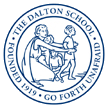The Dalton School
| Dalton School | |
|---|---|
 |
|
| Address | |
|
Middle & High School: 108 East 89th Street First Program: 53 East 91st Street Physical Education Center: 200 East 87th Street New York, NY |
|
| Information | |
| Type | Private, day, college-preparatory |
| Motto | Go Forth Unafraid |
| Established | 1919 |
| Founder | Helen Parkhurst |
| CEEB code | 333580 |
| Head of school | Ellen C. Stein '65 |
| Faculty | Approx. 250 |
| Grades | K–12 |
| Gender | Coeducational |
| Enrollment | Approx. 1300 |
| Campus | Urban |
| Color(s) | Royal blue and white |
| Mascot | Ivan the Tiger |
| Accreditation | NAIS, NYSAIS |
| Newspaper | The Daltonian |
| Endowment | Estimated at $65 million |
| Affiliations |
NAIS NYSAIS New York Interschool Global Online Academy |
| Literary magazine | Blue Flag |
| Political journal | RealPolitik |
| Technology journal | TechFluence |
| Website | dalton |
The Dalton School, originally the Children's University School, is a private, coeducational college preparatory school on New York City's Upper East Side and a member of both the Ivy Preparatory School League and the New York Interschool. The school is located in three buildings within Manhattan.
The Dalton School, originally called the Children's University School, was founded by Helen Parkhurst in 1919. It was a time marked by educational reform. Philosophers, teachers, and child psychologists identified as "progressives" began to question the conventional wisdom of the day which held that education was a process of drill and memorization and that the only way to teach was to regiment children in classrooms. Their natural instincts to play, to move, to talk, and to inquire freely were suppressed.
The name "Dalton" refers to Dalton in Massachusetts, where Parkhurst frequently visited. Progressive educators believed that the development of the whole child is of primary importance; that children are social beings and that schools should be communities where they can learn to live with others; that these communities should devote themselves to the total enrichment of mind, body, and spirit.
After experimentation in her own one-room school with Maria Montessori, Helen Parkhurst visited other progressive schools in Europe including Bedales School and its founder and headmaster John Haden Badley in England. She developed what she termed the Dalton Plan which called for teachers and students to work together toward individualized goals. The Laboratory Plan was first put into effect as an experiment in the high school of Dalton, Massachusetts, in 1916. The estate of her benefactor Josephine Porter Boardman, was also near the town of Dalton and from this beginning the Laboratory Plan and school eventually took their names.
...
Wikipedia
